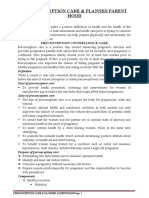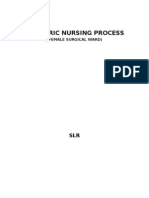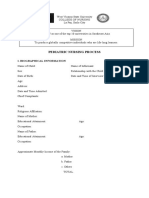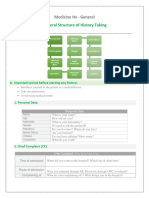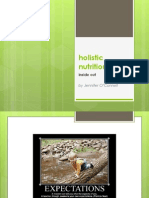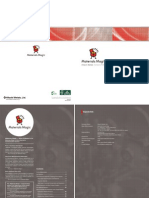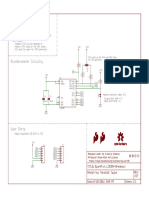OB Questions
OB Questions
Uploaded by
gelneta9Copyright:
Available Formats
OB Questions
OB Questions
Uploaded by
gelneta9Original Title
Copyright
Available Formats
Share this document
Did you find this document useful?
Is this content inappropriate?
Copyright:
Available Formats
OB Questions
OB Questions
Uploaded by
gelneta9Copyright:
Available Formats
OB/GYNE PATIENT ➤ Congenital disorders, hereditary diseases, multiple pregnancies,
diabetes, heart disease, hypertension,, mental retardation, renal
Name: disease or use of diethylstilbestrol (DES)
Address: (Note: daughters born to mothers who sustained their pregnancies
Contact Person: with DES may have uterine anomalies that increase their risk of
Religion: preterm labor or uterine hyperstimulation)
Sex:
Age: MATERNAL PSYCHOSOCIAL PROFILE
Birth Date:
Place of Birth: 1. HEALTH PERCEPTION-HEALTH MAINTENANCE PATTERN
Ethnicity: "How would you usually describe your health?"
Nationality: "Do you have any chronic illnesses?"
Race: "How would you describe your health at this time?"
Date of Admission: Review the daily health practices of the individual
Reason for Seeking Health Care: Dental care Exercise regimen
Marital Status: Food intake Fluid intake
Home Phone: Leisure activities
Work Phone: Responsibility in the family
Education: Use of the following:
Occupation: Tobacco Alcohol
Health Insurance: Salt, sugar, fat products Drugs
Source & Reliability:
Referral: Knowledge of safety practices
Advance Directives: Fire prevention Water safety
Room Number: Children/infants Poison
Attending Physician: control Automobile
Admitting/Final Diagnosis: bicycle
REASONS FOR SEEKING CARE Knowledge of Infant Care
Current Health Status (Narrative): Nutrition (bottle, breast-feeding)
Clothing needs
Onset of labor, activity performed prior to onset of labor, Hygiene needs
appearance of pink (bloody show), measures performed Sleep needs
to relieve pain and support systems available during Developmental needs
labor.
Characteristics of uterine contraction (duration, interval,
frequency, intensity) Other symptoms associated with
labor
Note: perform symptom analysis for non-pregnant client
2. NUTRITIONAL-METABOLIC PATTERN
✓ Present Obstetric History (pregnant) "What is the usual daily food intake (meals,
Gravity, Parity snacks)?" "What is the usual fluid intake (type,
Obstetric history may be summarized by a series of 4 digits using amount)?" "How is your appetite?"
the abbreviation TPAL or by a series of 6 digits using the Indigestion Nausea
abbreviation GTPALM. Vomiting Sore
mouth
T-erm/full term deliveries, 37 completed weeks or more "What are your food restrictions or preferences?"
P-reterm deliveries, 20 to less than 37 completed weeks A- "Any supplements (vitamins, feeding)?"
bortions; elective or spontaneous loss of pregnancy before the "Has your weight changed prior to pregnancy?" If yes, why?"
period of viability (less than 20 weeks) L-iving children a woman
has delivered 3. ELIMINATION PATTERN
M-ultiple gestations and births (not the number of neonates Bladder
delivered) "Are there any problems or complaints with the usual pattern of
Date of LMP (first day of last menstrual period) urinating?"
Estimated Date of birth-expected date of Oliguria Polyuria
confinement/ delivery Dysuria Dribbling
Signs and symptoms of pregnancy, amenorrhea, Retention Stress Incontinence
breast changes, nausea and vomiting, urinary Burning
frequency, skin pigmentation, enlargement of the
abdomen, fetal movement. Bowel
"What are the usual time, frequency, color, consistency, and
✓ Past Obstetric History pattern?"
• Problems of infertility, maternal, fetal and neonatal "Assistive devices (type, frequency)?"
complications Enemas Laxatives
• Woman's perception of past pregnancy, labor and delivery Catharics Suppositoriees
for herself and effect on her Family
4. ACTIVITY-EXERCISE PATTERN
Date Duratio Sex Weig Metho Place remar "Describe usual daily/ weekly activities of daily living."
of n of of ht of d of of ks Occupation
deliver Labor bab baby deliver deliver Leisure activities
y y y y Exercise pattern (type, frequency)
"Do you work outside the home?"
"Are there factors present that could interfere with activities at
✓ Medical History home (self-care, home care)?"
Lack of knowledge
➤ Childhood diseases (e.g. rubella, chicken pox) Lack of resources
➤ Major illnesses, surgery (especially of the reproductive tract),
blood transfusions 5. SLEEP-REST PATTERN
➤ Drug, food, environmental allergens "What is the usual sleep pattern?"
➤ Urinary infections, heart disease, diabetes, hypertension, Bed time Hours slept
endocrine disorders, anemias Sleep Aids Sleep routine
➤ Use of oral or other contraceptives "Any problems?"
History of STD Difficulty falling asleep
Menstrual history-start of menarche, duration, amount, Difficulty remaining asleep
regularity and pain (dysmenorrhea), bleeding between Not feeling rested after sleep
periods (metrorrhagia)
➤ Use of medications - prescriptions, OTC, other drugs, alcohol, 6. COGNITIVE-PERCEPTUAL PATTERN
tobacco, caffeine "Any deficits in sensory perception (hearing, sight, touch)?"
➤History of TB, hepatitis, group B beta streptococcus, HIV Glasses
Hearing aid
✓ Family History (Genogram) "Any complaints?
Vertigo
➤ Maternal and paternal history Insensitivity to superficial pain
Insensitivity to cold or heat
"Able to read & write?"
7. SELF-PERCEPTION PATTERN
"What are you most concerned about?"
"What are your present health goals?"
"How would you describe yourself?"
"How do you think your life will change with this baby?"
8. ROLE-RELATIONSHIP PATTERN
Relationships
"To whom do you turn to in time of need?"
Assess family life (members, educational level, occupations)
Cultural background
Decision making
Activities (lone or group)
Communication patterns
Roles
Finances
Assess for
Parenting difficulties
Difficulties with relative (in-laws, parents)
Marital difficulties
Abuse (physical, verbal, substance)
SEXUALITY-REPRODUCTIVE PATTERN
Age at menarche
Contraceptive use (type, years of use)
Leukorrhea, vaginal itching, postcoital bleeding, pain or cystitis
Sexual activities
"Have you been satisfied with the quality & quantity of your sexual
activities (your partner)?"
Any pain or discomfort with intercourse?""
"Has there been or do you expect a change in your sexual relations
(related to pregnancy, child care, breast-feeding)?"
10. COPING- STRESS PATTERN
"How do you make decisions (alone, with assistance, who)?"
"Has there been a loss in your life in the past year (or changes
moves, job, health)?"
"What do you like about yourself?"
"What would you like to change in your life?"
"What is preventing you?"
"What do you do when you are tense or under stress (eg, problem-
solve, eat, sleep, take medications, seek help)?"
11. VALUE-BELIEF SYSTEM
"With what (whom) do you find a source of strength or meaning?"
You might also like
- Pediatric Nursing AssessmentDocument8 pagesPediatric Nursing Assessmentmiss RN87% (15)
- Preconception Care & Planned ParenthoodDocument7 pagesPreconception Care & Planned ParenthoodDelphy Varghese86% (7)
- Preconception Care & Planned ParenthoodDocument7 pagesPreconception Care & Planned ParenthoodDelphy Varghese100% (9)
- Symbiosis: The Art of Living TogetherDocument4 pagesSymbiosis: The Art of Living TogetherSuzanne LasichNo ratings yet
- Akpsr-Mppt - 01 Manual v1.7Document24 pagesAkpsr-Mppt - 01 Manual v1.7Paul LousickNo ratings yet
- Acceptability and Sensory Characteristics of Ampalaya PandesalDocument20 pagesAcceptability and Sensory Characteristics of Ampalaya PandesaltanginamotalagaNo ratings yet
- Lady's Manual of Fancy Work 1859Document244 pagesLady's Manual of Fancy Work 1859MoonlightSeedling100% (13)
- Allen, S.M. - Encyclopedia of Materials - Science and Technology Spinodal DecompositionDocument4 pagesAllen, S.M. - Encyclopedia of Materials - Science and Technology Spinodal DecompositionDulce Job BenitezNo ratings yet
- Peds History TakingDocument12 pagesPeds History TakingHikmatyar KHaNNo ratings yet
- Pedia History Guide TemplateDocument13 pagesPedia History Guide TemplateKabir SiddiquiNo ratings yet
- Mother-Child BookDocument40 pagesMother-Child BookTherese Mae MadroneroNo ratings yet
- Pediatric Health AssessmentDocument11 pagesPediatric Health AssessmentGwyneth JangadNo ratings yet
- Nursing Interview Guide - HA - VIOSDocument9 pagesNursing Interview Guide - HA - VIOSIra Velle ViosNo ratings yet
- Maternal and Child Summary NotesDocument25 pagesMaternal and Child Summary Notesrossinniblue.protacioNo ratings yet
- HA Lecture Week 5 ROSDocument6 pagesHA Lecture Week 5 ROSLore Anne Mhae SantosNo ratings yet
- OBGYNE Assessment Tool FinalDocument9 pagesOBGYNE Assessment Tool Final2201102448No ratings yet
- Assessment of The Childbearing Woman: Nursing Health History FormatDocument12 pagesAssessment of The Childbearing Woman: Nursing Health History FormatJmy CoronadoNo ratings yet
- Health History and FHPDocument3 pagesHealth History and FHPLeonard LigutomNo ratings yet
- Medical NursingDocument16 pagesMedical NursingleuelNo ratings yet
- Interviewer: Wyeth Earl P. Endriano Clinical Group: E Clinical Instructor: Socorro Salvacion-Gasco, D.M, H.R.M, M.N, RNDocument10 pagesInterviewer: Wyeth Earl P. Endriano Clinical Group: E Clinical Instructor: Socorro Salvacion-Gasco, D.M, H.R.M, M.N, RNWyeth Earl Padar EndrianoNo ratings yet
- Nursing Assessment - Pediatric Clients in The Community New 1 1Document7 pagesNursing Assessment - Pediatric Clients in The Community New 1 1Ugalde AlyssakyleNo ratings yet
- Open Questioning: Ob GynDocument1 pageOpen Questioning: Ob GynConcepcion R. AquinoNo ratings yet
- Questionnaire For PregnancyDocument5 pagesQuestionnaire For PregnancyEllehcim Zaracla ZuprocNo ratings yet
- Pediatrics PowerpointDocument43 pagesPediatrics PowerpointNeal KeebleNo ratings yet
- 1 Health History Woman PDFDocument3 pages1 Health History Woman PDFAhlem LahidhebNo ratings yet
- A1 INTAKE Version 2023Document4 pagesA1 INTAKE Version 2023eljunNo ratings yet
- Patient History FormDocument2 pagesPatient History FormHelmiNo ratings yet
- Paediatric NP FormDocument2 pagesPaediatric NP FormBOWEN TLCNo ratings yet
- INTAKE FORM From Parents Ver 2022Document4 pagesINTAKE FORM From Parents Ver 2022Reymart PalaganasNo ratings yet
- Guide For Newborn Assessment - MODIFIEDDocument7 pagesGuide For Newborn Assessment - MODIFIEDPhilip NanaligNo ratings yet
- Paediatric Examination Handbook 2015Document66 pagesPaediatric Examination Handbook 2015Ulfa Rahmadanti SetiawanNo ratings yet
- OB/GYN Care Visit: Personal InformationDocument7 pagesOB/GYN Care Visit: Personal InformationsinarNo ratings yet
- Pediatric Nursing ProcessDocument9 pagesPediatric Nursing Processpircano0% (1)
- Under 5 ChildrenDocument6 pagesUnder 5 ChildrenKrishan38No ratings yet
- Draft 3-30-2024 Ob Case StudyDocument54 pagesDraft 3-30-2024 Ob Case StudyKent Jerimhe Daileg ManiaulNo ratings yet
- Post Natal Care Kelompok 5 (Repaired)Document11 pagesPost Natal Care Kelompok 5 (Repaired)vitaNo ratings yet
- Newborn Infant Nursing Process GuideDocument2 pagesNewborn Infant Nursing Process GuideDeannahTampusNo ratings yet
- Pediatric Nursing Process: I. Biographical InformationDocument11 pagesPediatric Nursing Process: I. Biographical InformationChin Michael AngNo ratings yet
- Module 6.exploring Ocmplexities of Nursing When Postpartum Families Experience Newborn Health ChallengesDocument75 pagesModule 6.exploring Ocmplexities of Nursing When Postpartum Families Experience Newborn Health Challengesyaz19992010No ratings yet
- Feeding Case History 2Document9 pagesFeeding Case History 2aseelbo50No ratings yet
- CMCA - Week 6 PPT B Prenatal AssessmentDocument55 pagesCMCA - Week 6 PPT B Prenatal AssessmentgpbantaNo ratings yet
- Ob AssessmentDocument7 pagesOb AssessmentAlyssa LippNo ratings yet
- Functional Health Pattern AssessmentDocument3 pagesFunctional Health Pattern AssessmentDanette Mae RocNo ratings yet
- Kisi Instrument KeluargaDocument7 pagesKisi Instrument Keluargaokkui medisNo ratings yet
- HistoryDocument6 pagesHistoryOsama ALGabriNo ratings yet
- FormsDocument7 pagesFormsVecarose dagliNo ratings yet
- Development FormDocument1 pageDevelopment FormsciptNo ratings yet
- Female Vaginal Dysuria - Dains Chap. 35Document4 pagesFemale Vaginal Dysuria - Dains Chap. 35Rebecca SperryNo ratings yet
- Mother and Child Health CareDocument18 pagesMother and Child Health CareVaishnaviNo ratings yet
- Medicine General HXDocument5 pagesMedicine General HXudazxfNo ratings yet
- Initial Functional MedicineQuestionnaireDocument4 pagesInitial Functional MedicineQuestionnaireterryNo ratings yet
- Health History by Gordon's Functional Health PatternDocument7 pagesHealth History by Gordon's Functional Health PatternAveriAlonzoNo ratings yet
- PNC Case ProformaDocument7 pagesPNC Case ProformaKrishan38No ratings yet
- Nursing Interview Guide - HADocument6 pagesNursing Interview Guide - HAJohn CenaNo ratings yet
- Little Book of Paeds - Exam-1Document81 pagesLittle Book of Paeds - Exam-147rqmgyt2xNo ratings yet
- First Trimester Pregnancy and Women's Health: Do's and Don'ts, Nutrition, Harmful Prescription Drugs, Birth DefectsDocument7 pagesFirst Trimester Pregnancy and Women's Health: Do's and Don'ts, Nutrition, Harmful Prescription Drugs, Birth DefectskauseliaNo ratings yet
- Intrauterine Fetal DemiseDocument17 pagesIntrauterine Fetal DemiseDewey NguyenNo ratings yet
- Pediatric History Taking-1Document21 pagesPediatric History Taking-1Blessed AbigaelNo ratings yet
- Health 8 - Module 4Document8 pagesHealth 8 - Module 4Lyka Bactong DICES MNKNo ratings yet
- Post Partum Interview FormatsDocument11 pagesPost Partum Interview FormatsRIBO, DELNo ratings yet
- Holistic Nutrition: Inside OutDocument39 pagesHolistic Nutrition: Inside OutpasinNo ratings yet
- History Obstetrics 3Document15 pagesHistory Obstetrics 3VICTOR OLUWAKEYENo ratings yet
- Anc 1 2 1Document22 pagesAnc 1 2 1Lemma AbishaNo ratings yet
- Complete Health History FormatDocument3 pagesComplete Health History FormatAngela jane MadristaNo ratings yet
- The Field Guide to Pregnancy: Navigating New Territory with Research, Recipes, and RemediesFrom EverandThe Field Guide to Pregnancy: Navigating New Territory with Research, Recipes, and RemediesRating: 1 out of 5 stars1/5 (2)
- Nature of GeographyDocument241 pagesNature of GeographyIndrajit PalNo ratings yet
- Toyota Powered Stacker Trucks: The BT Staxio RangeDocument16 pagesToyota Powered Stacker Trucks: The BT Staxio RangeFrancisco MoncayoNo ratings yet
- EEG383 Measurement - Chapter 2 - Characteristics of Measuring InstrumentsDocument26 pagesEEG383 Measurement - Chapter 2 - Characteristics of Measuring Instrumentsايهاب غزالة100% (1)
- Hitatchi ProfileDocument15 pagesHitatchi ProfileAbdul AleemNo ratings yet
- Banner Cloud Data Services: Instruction ManualDocument29 pagesBanner Cloud Data Services: Instruction ManualLeo VazquezNo ratings yet
- Bcp380 48ledlp 30k 24v A4 l100 DMXDocument2 pagesBcp380 48ledlp 30k 24v A4 l100 DMXEdi NugrohoNo ratings yet
- C146 E251f PDFDocument20 pagesC146 E251f PDFfmq04No ratings yet
- Selector Switch Operators CatalogDocument2 pagesSelector Switch Operators Catalogjesdcp7No ratings yet
- Symbolism and AllegoryDocument13 pagesSymbolism and Allegory김민재No ratings yet
- FSC Changes MIX Label TextDocument2 pagesFSC Changes MIX Label TextHanan ZayedNo ratings yet
- SH-3 Sea King - History Wars Weapons PDFDocument2 pagesSH-3 Sea King - History Wars Weapons PDFchelcarNo ratings yet
- Technology Will Save Us: Diy Electro SynthDocument16 pagesTechnology Will Save Us: Diy Electro SynthsansnomNo ratings yet
- Food BiotechnologyDocument28 pagesFood BiotechnologyJhon Ford SalumbidesNo ratings yet
- Science9 - q4 - CLAS4 - Conservation-of-Mechanical-Energy - V67-Copy - RHEA ANN NAVILLADocument13 pagesScience9 - q4 - CLAS4 - Conservation-of-Mechanical-Energy - V67-Copy - RHEA ANN NAVILLAParangue Manuel Karen Ann100% (1)
- DJM20042 Electronic Systems: Chapter 2-2 Semiconductor Devices (Fet, Mosfet, Ujt)Document41 pagesDJM20042 Electronic Systems: Chapter 2-2 Semiconductor Devices (Fet, Mosfet, Ujt)Aiman fakriNo ratings yet
- Fpb1a3030s13w CCT Led Panels ManualDocument16 pagesFpb1a3030s13w CCT Led Panels Manualnosas4gNo ratings yet
- How To Prepare For Texas InstrumentsDocument6 pagesHow To Prepare For Texas InstrumentsSasi TejaNo ratings yet
- Numerical Analysis of The Breaking Wave Impact On The Monopile Support StructureDocument11 pagesNumerical Analysis of The Breaking Wave Impact On The Monopile Support StructuredujeveicNo ratings yet
- Design of Reinforced Concrete: University of Wasit-College of Engineering Civil Engineering DepartmentDocument12 pagesDesign of Reinforced Concrete: University of Wasit-College of Engineering Civil Engineering DepartmentSomaNo ratings yet
- SparkFun LIS3DH BreakoutDocument1 pageSparkFun LIS3DH Breakout92alaaNo ratings yet
- Theory of FormsDocument2 pagesTheory of FormslauNo ratings yet
- (Taken From The) : Curriculum GuideDocument14 pages(Taken From The) : Curriculum GuideMERCEDITA S. TOJINONo ratings yet
- 03 CPM Project ParticipantsDocument64 pages03 CPM Project ParticipantsGORKEM KARAKOSENo ratings yet
- SCMS Vol 32 No 2 QOL EffectsDocument9 pagesSCMS Vol 32 No 2 QOL EffectsAna NunesNo ratings yet
- Beneview T8: Consecutivos: 12, 15, 53, 54, 55, 56, 57, 58, 59, 60, 107, 108, 109, 110, 111 Y 112Document192 pagesBeneview T8: Consecutivos: 12, 15, 53, 54, 55, 56, 57, 58, 59, 60, 107, 108, 109, 110, 111 Y 112Ventas IPSUM Soluciones HospitalariasNo ratings yet


